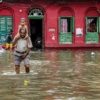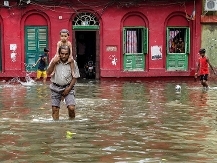When the Intergovernmental Panel on Climate Change (IPCC) released its report ‘Global Warming of 1.5 °C’ on October 8, it caused a flurry of media coverage and response. The report warned the world that we are headed for a series of increasingly disastrous tipping points, prompting Foreign Affairs to describe its message as ‘apocalyptic’. What are the effects of concepts such as ‘tipping points’ and the increasing severity and intensity of the discourse on climate change on the public, policy makers and ultimately, our future?
The IPCC report confirms that we are on route to a series of tipping points in our global climate system, and that only the most improbable policy standards will prevent mass drought, climate migration, flooding, food shortages, and extreme weather as soon as the next 12 years.
The media coverage that has followed the report has been unusually aggressive and marks something of a turning point in the discourse of climate change. There are a number of reasons for this turn in climate discourse, including an important interview with Donald Trump that came out around the same time as the IPCC press conference in South Korea, during which he redacted his earlier claim that climate change was a ‘hoax’, but still insisted it might have nothing to do with humans, as well as the severity and timeline of the IPCC report.
Importantly, the report came out the same day that William Nordhaus was awarded the Nobel prize in economics for his carbon pricing model. Putting a price on the social costs of carbon is quickly becoming understood as the primary means for mitigating against 1.5C increase in global average temperature before the “line in the sand” 12 years from now. As a media event, carbon pricing and the line in the sand have quickly turned into a single narrative about how to avoid a major climate tipping point.
In a roundtable discussion, speakers from different disciplines discuss the complexities of environmental communication, severity and reality in policymaking and advice.
About the speakers
Imre Szeman is founder of the Petrocultures Research Group, authors of the book After Oil. Imre is professor of environmental communication at Waterloo University in Canada and has published dozens of books and articles on fossil fuels, critical theory, and environmental communication.
Joyeeta Gupta, current professor of environment and development in the Global South at the UVA, was professor of Climate Change Policy and Law at the VU, lead author in three IPCC reports, and current co-chair of UN Environment’s Global Environmental Outlook.
Jeff Diamanti (moderator) teaches Literary and Cultural Analysis at the UvA. His work tracks the relationship between fossil fuels and media. As Postdoctoral Fellow in Media and the Environment at McGill he co-convened the international colloquium on Climate Realism.
Petra van der Kooij is a PhD student in political philosophy and climate ethics. She works on climate justice, fair ecological limits and political inertia.
Rhodante Ahlers is Senior Researcher at Stichting Onderzoek Multinationale Ondernemingen (Centre for Research on Multinational Corporations).
Register
You can sign up for this program for free. If you subscribe for the program we count on your presence. If you are unable to attend, please let us know via spui25@uva.nl | T: +31 (0)20 525 8142. More information can be found here.

